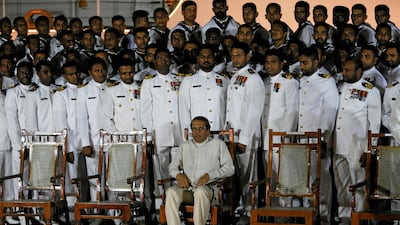The wounds of Sri Lanka’s Easter bombings, which left 250 people dead on a single bloody day in April, have yet to heal. Reminded of the very worst atrocities of the country’s decades-long civil war, the Sri Lankan people showed remarkable solidarity and resilience in the aftermath. Within hours of the last blast, emergency blood banks across the nation were full. However, the same cannot be said of the nation’s leaders.
On Friday, President Maithripala Sirisena threatened to end a parliamentary investigation – launched by his political nemesis, Prime Minister Ranil Wickremensinghe – designed to identify security lapses that allowed April's attacks to happen. His threats followed two high-profile testimonies that accused Mr Sirisena of mishandling the nation's security.
In one, the inspector general of police told parliament that the president had offered him a diplomatic posting if he quit his job and took the fall for the attacks. When the inspector general refused, he was put on leave. Rather than seeking to stifle an investigation, Mr Sirisena should be doing all he can to help identify security gaps and take urgent action to plug them.
Despite repeated warnings from Indian intelligence agents to Sri Lankan authorities of the possibility that an ISIS-linked plot was under way, Colombo was slow to act. According to his allies, Mr Wickremesinghe had been kept out of security council meetings altogether by the president. The deteriorating relationship between the two men followed the sacking and subsequent reinstatement of Mr Wickremesinghe by Mr Sirisena late last year. The Easter bombings were a day of reckoning for Sri Lanka's warring leaders, who had to contend with the possibility that pride and politics had indirectly cost hundreds of Sri Lankan lives.
This context makes Mr Sirisena's latest actions all the more irresponsible. Politically motivated investigations help no one, but the flaws in Sri Lanka's security apparatus enabled a local group to commit indescribable atrocities, with the help of an international terrorist network. This must be addressed and those responsible held to account. In the aftermath of the attack, Sri Lanka's leaders fought hard to deny that their negligence had played a part. Judging by his behaviour on Friday, it appears Mr Sirisena is losing that battle.

